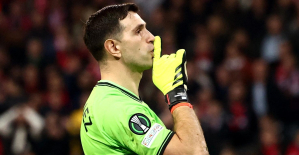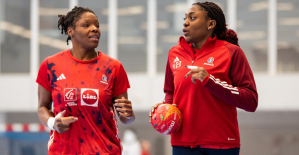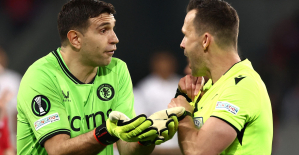Captain Camara, ephemeral and extravagant self-proclaimed president, and a dozen other former military and government officials will respond to a litany of assassinations, sexual violence, kidnappings, fires, looting, qualifications that do not account for the abominations committed there at 13 years old.
That day, the red berets of the presidential guard, police, gendarmes and militiamen caused a bloodbath to flow with unbridled cruelty and inhuman coldness during the gathering of tens of thousands of opposition sympathizers, gathered in a stadium in the suburbs of Conakry to peacefully demonstrate their strength and dissuade Mr. Camara from running for president in January 2010.
A multitude of testimonies report how the Red Berets entered the compound, cordoned off the access and opened fire indiscriminately on a festive and unarmed crowd.
The men continued their work with knives, machetes and bayonets, strewing the lawn, aisles and corridors inside and outside the stadium with corpses. They abused dozens of women and finished off many of them.
The abuses continued the days after, against sequestered women and tortured detainees.
During those days, at least 156 people were killed and hundreds injured, at least 109 women were raped, according to the report of an international commission of inquiry mandated by the UN.
- "Honor" -
The actual numbers are likely higher. The acts committed constitute crimes against humanity, concluded the commission three months after the events.
The commission charges Captain Camara with "personal criminal responsibility and command responsibility". The officers and units involved responded to his command. Whether or not he gave the order to commit the crimes, he did nothing to prevent them.
Brought to power by a coup nine months earlier, dismissed a few months after the massacre, since exiled to Burkina Faso, he slept in prison for the first time.
Justice on Tuesday ordered his detention as well as that of his co-defendants still free. They could stay there until the end of the trial, which is of indefinite duration, said one of their lawyers.
Captain Camara, 58 years old today, returned in the night from Saturday to Sunday in Conakry to participate in his trial and, according to his relatives, "to clear his honor".
In the box must also take place, among the main defendants, Lieutenant Aboubacar Sidiki Diakité, alias Toumba, aide-de-camp of Dadis Camara; Commander Moussa Thiéboro Camara, one of the figures of the junta, both present at the stadium according to witnesses; officer Claude Pivi, close to Dadis Camara and one of the commanders of the presidential guard; and Colonel Abdoulaye Chérif Diaby, former Minister of Health.
The latter is suspected of having ensured that the wounded were deprived of treatment and of having participated in the large-scale enterprise consisting in removing the bodies and concealing the evidence.
- "Boussole" -
To see their faces, the victims would have to crowd in front of the new court built on purpose in the center of Conakry and barely completed.
The procrastination of power and the impunity erected into an "institution", according to the international commission, of almost untouchable security forces in a country ruled for decades by authoritarian regimes have long cast doubt on the holding of the trial.
Victims' organisations, human rights defenders and the International Criminal Court have kept up the pressure on the authorities to make that day come. Karim Khan, prosecutor of the ICC, an institution likely to replace the Guinean State if the latter fails to render justice, is expected at the opening.
The lack of political will and the apparent fear of rekindling old demons in a country with a troubled political history have been blamed. Defendants held high positions under the Condé presidency (2010-2021).
It is finally under a new junta leader that the trial must be held, set up as a marker of the fight against impunity.
Colonel Mamady Doumbouya has called for the trial to take place this year before the anniversary date. Came to power by a putsch in 2021, he proclaimed to make justice his "compass".
Rights advocates, however, point out that the past few months have seen new authorities crack down on freedoms. And they claim that the trial is not a pretense.

 Sydney: Assyrian bishop stabbed, conservative TikToker outspoken on Islam
Sydney: Assyrian bishop stabbed, conservative TikToker outspoken on Islam Torrential rains in Dubai: “The event is so intense that we cannot find analogues in our databases”
Torrential rains in Dubai: “The event is so intense that we cannot find analogues in our databases” Rishi Sunak wants a tobacco-free UK
Rishi Sunak wants a tobacco-free UK In Africa, the number of millionaires will boom over the next ten years
In Africa, the number of millionaires will boom over the next ten years WHO concerned about spread of H5N1 avian flu to new species, including humans
WHO concerned about spread of H5N1 avian flu to new species, including humans New generation mosquito nets prove much more effective against malaria
New generation mosquito nets prove much more effective against malaria Covid-19: everything you need to know about the new vaccination campaign which is starting
Covid-19: everything you need to know about the new vaccination campaign which is starting The best laptops of the moment boast artificial intelligence
The best laptops of the moment boast artificial intelligence Bitcoin halving: what will the planned reduction in emissions from the queen of cryptos change?
Bitcoin halving: what will the planned reduction in emissions from the queen of cryptos change? The Flink home shopping delivery platform will be liquidated in France
The Flink home shopping delivery platform will be liquidated in France Bercy threatens to veto the sale of Biogaran (Servier) to an Indian industrialist
Bercy threatens to veto the sale of Biogaran (Servier) to an Indian industrialist Switch or signaling breakdown, operating incident or catenaries... Do you speak the language of RATP and SNCF?
Switch or signaling breakdown, operating incident or catenaries... Do you speak the language of RATP and SNCF? The main facade of the old Copenhagen Stock Exchange collapsed, two days after the fire started
The main facade of the old Copenhagen Stock Exchange collapsed, two days after the fire started Alain Delon decorated by Ukraine for his support in the conflict against Russia
Alain Delon decorated by Ukraine for his support in the conflict against Russia Who’s Who launches the first edition of its literary prize
Who’s Who launches the first edition of its literary prize Sylvain Amic appointed to the Musée d’Orsay to replace Christophe Leribault
Sylvain Amic appointed to the Musée d’Orsay to replace Christophe Leribault Skoda Kodiaq 2024: a 'beast' plug-in hybrid SUV
Skoda Kodiaq 2024: a 'beast' plug-in hybrid SUV Tesla launches a new Model Y with 600 km of autonomy at a "more accessible price"
Tesla launches a new Model Y with 600 km of autonomy at a "more accessible price" The 10 best-selling cars in March 2024 in Spain: sales fall due to Easter
The 10 best-selling cars in March 2024 in Spain: sales fall due to Easter A private jet company buys more than 100 flying cars
A private jet company buys more than 100 flying cars This is how housing prices have changed in Spain in the last decade
This is how housing prices have changed in Spain in the last decade The home mortgage firm drops 10% in January and interest soars to 3.46%
The home mortgage firm drops 10% in January and interest soars to 3.46% The jewel of the Rocío de Nagüeles urbanization: a dream villa in Marbella
The jewel of the Rocío de Nagüeles urbanization: a dream villa in Marbella Rental prices grow by 7.3% in February: where does it go up and where does it go down?
Rental prices grow by 7.3% in February: where does it go up and where does it go down? With the promise of a “real burst of authority”, Gabriel Attal provokes the ire of the opposition
With the promise of a “real burst of authority”, Gabriel Attal provokes the ire of the opposition Europeans: the schedule of debates to follow between now and June 9
Europeans: the schedule of debates to follow between now and June 9 Europeans: “In France, there is a left and there is a right,” assures Bellamy
Europeans: “In France, there is a left and there is a right,” assures Bellamy During the night of the economy, the right points out the budgetary flaws of the macronie
During the night of the economy, the right points out the budgetary flaws of the macronie These French cities that will boycott the World Cup in Qatar
These French cities that will boycott the World Cup in Qatar Europa Conference League: the semi-final flies to Lille, which loses to the wire against Aston Villa
Europa Conference League: the semi-final flies to Lille, which loses to the wire against Aston Villa Lille-Aston Villa: Cash disgusts Lille, the arbitration too... The tops and the flops
Lille-Aston Villa: Cash disgusts Lille, the arbitration too... The tops and the flops Handball: Les Bleues in the same group as Spain at Euro 2024
Handball: Les Bleues in the same group as Spain at Euro 2024 Europa Conference League: for Létang, Martinez “does not have the attitude of a high-level athlete”
Europa Conference League: for Létang, Martinez “does not have the attitude of a high-level athlete”


















